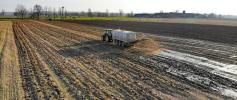Horizon Europe Neutral Weed Project: Understanding Neutral Weed Communities: Crop Interactions and Identifying Artificial Intelligence Algorithms for Robotic Weed Management of Species-Specific Weeds
- Type Project
- Status Signed
- Execution 2024 -2028
- Assigned Budget 1.237.400,00 €
- Scope Europeo
- Main source of financing Horizon Europe 2021-2027
- Project website Proyecto NEUTRAWEED
Identifying new, sustainable approaches to reducing intensive tillage and pesticide use, as well as increasing ecosystem services and biodiversity, is crucial. Supported by the Maria Skłodowska Curie Actions program, the NEUTRAWEED project will establish an international network of 16 organizations in Europe, Africa, Asia, and the Americas to explore new robotic systems and AI algorithms capable of recognizing weed species and selectively eliminating them to achieve neutral weed communities (NWCs).
NWCs are weed communities that can coexist with crops without reducing yield or quality compared to weed-free conditions. A central research focus will be on understanding the interactions between NWCs and crops from agroecological, molecular, physiological, and microbiological perspectives. Dr. Marco Esposito (ID: SPSMRC92P14F839P) is the NEUTRAWEED coordinator.
The overall objective of NEUTRAWEED is to form an international, cross-sector network of 16 organizations across four continents (Europe, Africa, Asia, and the Americas) working on a joint research program in the fields of weed ecology and management, artificial intelligence (AI), and robotics. New, sustainable solutions for weed management are called for, as the overreliance on chemical control and intensive tillage in oversimplified cropping systems is now being questioned due to its many drawbacks. As a solution, we propose the promotion of neutral weed communities (NWCs), which are weed communities that can coexist with crops without reducing crop yield or quality compared to weed-free conditions.
In this four-year research plan, we propose:
- Identify NWC in various cropping systems and study their interactions with crops and other biotic agents.
- Investigate its effect on the provision of ecosystem services.
- Develop prototypes of weed-killing robots for specific weed analysis.
Identify AI algorithms for weed species-specific discrimination and test them on robots to achieve NWC. A multidisciplinary and cross-sectoral approach will be used to understand the multiple interactions between weeds and crops from four perspectives: agroecological, physiological, molecular, and microbiological.
Using images of weed species, artificial intelligence algorithms will be developed and tested on autonomous robots to achieve NWC by selectively eliminating only highly competitive weed species and leaving only beneficial ones. Staff members will develop new skills and competencies, be exposed to new research environments, and broaden their career prospects.
NEUTRAWEED will promote research by fostering interconnections between countries, providing academic and technical training and education, and engaging with local, national, and international stakeholders to create shared knowledge on weed-crop interactions and new sustainable AI technological solutions for weed control.






